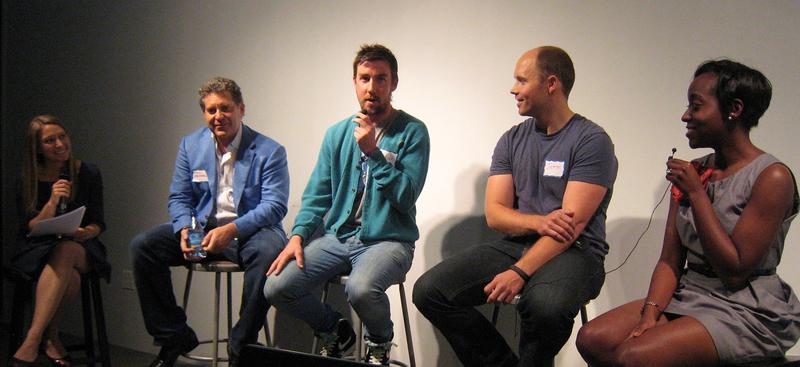Inspired by the release of Share or Die, the May installment of Collaborative Chats focused on the Millennial generation and asked: How will the unique character of Generation Y shape the growth of the sharing economy and build a sustainable post-recession society? Hosted at Airbnb HQ in San Francisco and moderated by Emily Castor, the panelists included:
- Eric Greenberg, A serial entrepreneur and author of Generation We
- Jeff Miller, Founder and CEO of Wheelz
- Morgan Fitzgibbons, Co-founder of the Wigg Party and an adjunct faculty member at the University of San Francisco
- Milicent Johnson, Shareable’s Community Engagement Manager
During the panel, the group explored what makes Millennials unique — their use of technology and peer-to-peer markets, their altruism and desire to collaborate, their mobility and changing relationship with consumerism, all of which have the potential to help create a shift that will support the collaborative consumption movement. The question of whether or not people will stop sharing once the economy gets better, making collaborative consumption a “relic of the recession” was on a lot of people’s minds, as was questions about whether Millennials in other countries like Asia, Africa, and South America were also more apt to share and use collaborative consumption tools as their economies grow.
Check out the video and some highlights from the panel discussion:
This year, we’ve seen Mutual Aid in Motion.
From scaling sharing hubs to Mutual Aid 101 trainings, we’re helping communities build the tools they need.
Every dollar fuels lasting resilience – proving that when we move together, we all move forward.
- Technology: Millennials’ use of technology is different from older generations’ usage. Jeff observed that today’s college students are used to living their lives on Facebook and believe that email is for “old people.” As their relationship with technology gets stronger, so does their connection and willingness to share with strangers.
- Challenges: Eric cited the greatest challenge facing Millennials as the $15 trillion in U.S. debt and trillions in Medicaid entitlements. In the breakout discussion some of the other challenges mentioned included: finding jobs, income inequality, climate change, getting money out of politics, and transitioning off of fossil fuels.
- Changing consumption patterns: Milicent mentioned how Millennials have gone from tapes to CDs to MP3s and now they just don’t want stuff. The concept of having access to things like cars in the way that you have access to your music through a cloud player is not that foreign anymore. Morgan pointed out that a lot of the change away from consumption is because of Millennials’ knowledge of the huge environmental problems that exist. Jeff added that the difference with Millennials is that they don’t have to be untrained and retrained; they haven’t owned cars before, so if you can introduce car sharing in college, they’re more likely to adapt that behavior in the future.
- A return to community resilience: Eric reminded the audience that the sharing economy isn’t new, this is what America was like 50 years ago. Morgan metnioned that what the Wigg Party has really been doing has been building community. Milicent added that this generation has an incredible opportunity to not just share stuff but to find abundance and to discover that it’s possible to get what what we need from each other. This can lead to resilient communities, which is increasingly important as the world goes crazy around us. It’s hard to take a leap off the beaten path and do something new by yourself, she said, but with the sharing economy you don’t have to do things alone.
- Sharing bubble? There was discussion of whether San Francisco and the sharing community in general is a kind of inward-gazing “sharing bubble.” Milicent countered the notion by pointing out that in lots of communities there’s a need to do things differently and so sharing is not just for privileged people. Many communities are banding together to create their own resilience through sharing and collaboration. Jeff said that we’re absolutely in a sharing bubble in San Francisco, but that personal stories are the way to reach new people in other communities. By creating role models and examples of the power of sharing, we can show that this is a movement that’s here to stay.
- Changing the story: Milicent closed out the discussion by calling on all of us to tell our stories and the larger story of the transformation that is happening around us — which is what motivated Shareable to create Share or Die and the Share Or Die Storytelling Contest.
To end with a positive quote from Morgan — who borrowed a phrase from Jon Gertner — revolutions happen quickly but they dawn slowly. We’re dawning now.
So, what are your thoughts? How will the unique character of Generation Y shape the growth of the sharing economy and build a sustainable post-recession society?

